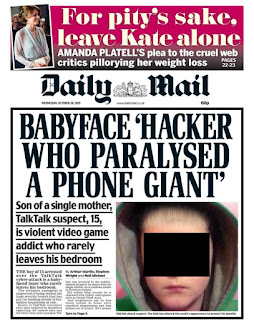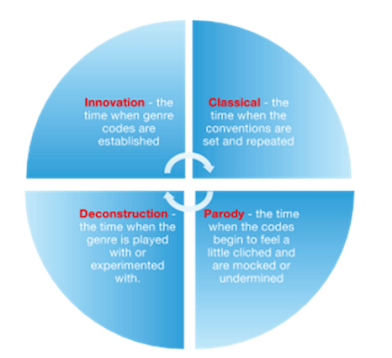Audience theory 1: blog tasks
Hypodermic needle model
1) Read this Mail Online article about the effects of videogames. How does this article link to the hypodermic needle model? Can't open it, the link doesn't work for me.
2) How does coverage of the Talk Talk hacking case (see Daily Mail front page below) link to the hypodermic needle model? Why might someone criticise this front page?
Can't lie sir, I have been looking at this front page for a while and I'm still confused about it.
3) What do you think of the hypodermic needle theory? Do audiences believe everything they see in the media? It is a simple theory but it's very true. Most thing the mainstream media "feeds" us are covers for lies that they don't want us to know. Most people aren't critical thinkers and believe things people with "power"(influencers of any kind) say without thinking twice about it.
Two-step flow model
1) Summarise the two-step flow model. What is an opinion leader? Somebody that leads people by giving his opinion on something and people believing him like they are a god just cause they have a little bit of fame.
2) How do influencers like Zendaya fit into the two-step flow model? They are opinion, they give their opinions and people follow them.
3) In your opinion, is the two-step flow theory still relevant today? Now more then ever. In the age of the internet where untalented people have immense fame, power and wealth people follow them blindly.
Uses and Gratifications theory
1) For each of the four categories, write about one media text (e.g. film, TV programme, newspaper etc.) that fits that particular audience use or pleasure. Make sure you explain WHY it fits the category and use images or clips to illustrate your points. The first one is done for you.
Diversion: Film - Blinded By The Light. Entertaining and offering escapism for fans of Bruce Springsteen or anyone that enjoys coming of age films or culture-clash comedies.
Personal Relationships: One Piece. The most popular anime to exist and having watched nearly 1000 episodes of it I can say I have gotten attached to the crew.
Personal Identity: I don't feel like I identify with and media, the characters I might be able to argue that I identify are characters that are simply human. Just like me they have human emotions and it doesn't make me feel like I have personal connection with them.
Surveillance: Tik Tok. This my sound weird to say but the influencers that I follow give no bs information and say it how it is and have a record of speaking facts.
Dependency theory
1) Do you agree that audiences have become dependent on the media? What evidence or examples can you provide to support your view?
Definitely, like I said, most people aren't critical thinkers so using that fact and manipulating them to think about certain things is easy. The Andrew Tate for example. There are dozens of videos of youtubers coming up to random people and asking them why they don't like him and all of them say he is a misogynies and a sexist and when asked to give examples they cant. They freeze like robots who have been brainwashed to hate somebody and haven't done any research why they hate him.
2) How has the growth of new and digital technology in the last 15 years changed people's dependency on the media? Is this a new problem?
2) How has the growth of new and digital technology in the last 15 years changed people's dependency on the media? Is this a new problem?
Communication has got global with new technologies which means with couple of clicks people can get information about anything in matter of seconds. This only becomes a problem when people don't use that power to form their own opinions rather their opinions are somebodies else's.
3) Reflecting on your own media use, how does your media consumption impact on your emotions? Does the media have an overall positive or negative impact on your health and wellbeing? Why? Recently I have gotten into mental health and have realised how much my brain has been fried from all of the used of social media. Now to say media overall is negative is just wrong. Spreading awareness and communication with friends far away has helped with many things. Media is a double edged sword. Like everything in life too much of something will always be bad for you no matter what it is.
3) Reflecting on your own media use, how does your media consumption impact on your emotions? Does the media have an overall positive or negative impact on your health and wellbeing? Why? Recently I have gotten into mental health and have realised how much my brain has been fried from all of the used of social media. Now to say media overall is negative is just wrong. Spreading awareness and communication with friends far away has helped with many things. Media is a double edged sword. Like everything in life too much of something will always be bad for you no matter what it is.


Comments
Post a Comment